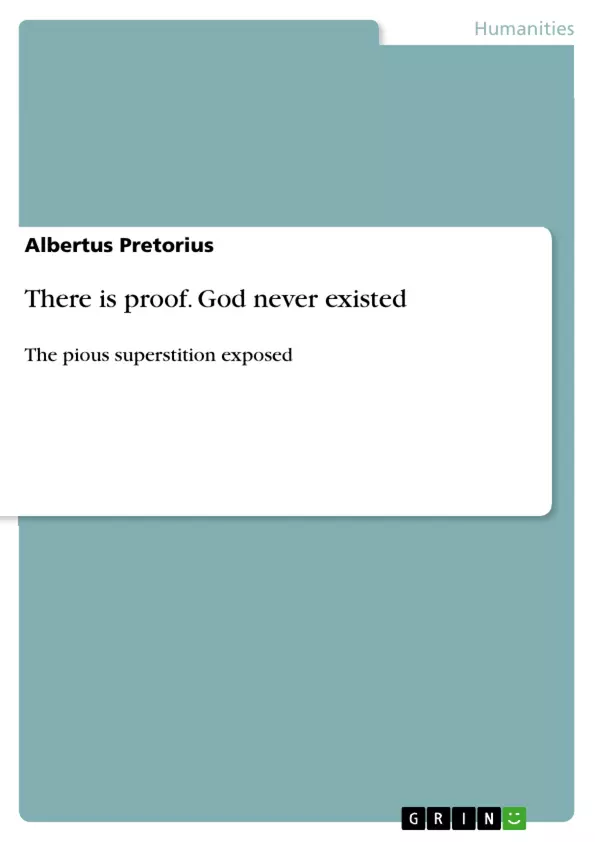The decline of Christianity world-wide is no secret and it may be expected that churches will die, or – at most – become fringe phenomena. As science progresses it gets clear that the Bible cannot be regarded as God-inspired due to all its mistakes, contradictions, fiction dressed up as history and inhumane laws. It is also evident that Jesus of Nazareth was no divine person but only an ordinary human being who had delusional dreams about becoming king of the Jews, that Paul of Tarsus invented Christianity by combining elements of the Old Testament with paganism on account of a series of visions or halluciniations he said he had had, that Christian doctrines are often irrational superstitions, and that one may lead a meaningful and moral life without being religious. Some new perspectives on the life of Jesus of Nazareth are given, as well as novel arguments to prove that God never existed. It is shown that the universe is ruled by rational axioms, which may be regarded as eternal and even divine. This book contains much that will keep theologians, philosophers and scientists busy, but it is also aimed at the layperson who is interested in religion, philosphy and science.
Inhaltsverzeichnis (Table of Contents)
- Preface
- Introduction
- The Bible
- The Bible is not God-Inspired
- Errors and Contradictions in the Bible
- Fiction Dressed Up as History
- Inhumane Laws in the Bible
- Jesus of Nazareth
- Jesus Was Not Divine
- Jesus' Delusional Dreams
- The Life of Jesus
- Paul of Tarsus
- Paul Invented Christianity
- Paul's Visions and Hallucinations
- Paul's Theology
- Christianity
- Christian Doctrines are Irrational Superstitions
- One Can Lead a Meaningful and Moral Life Without Being Religious
- The Universe
- The Universe is Ruled by Rational Axioms
- The Axioms are Eternal and Divine
- Conclusion
Zielsetzung und Themenschwerpunkte (Objectives and Key Themes)
This book aims to demonstrate that God never existed. It does so by critically examining the Bible, Christianity, and the life of Jesus of Nazareth. The book also explores the nature of the universe and argues that it is governed by rational axioms.
- The Bible is not a reliable source of truth.
- Jesus of Nazareth was not divine but an ordinary human being with delusional dreams.
- Paul of Tarsus invented Christianity based on his own visions and hallucinations.
- Christian doctrines are irrational superstitions.
- A meaningful and moral life can be lived without religion.
Zusammenfassung der Kapitel (Chapter Summaries)
- Preface: This section introduces the author and his motivations for writing the book. It also provides a brief overview of the key arguments that will be presented.
- Introduction: The book begins by examining the decline of Christianity worldwide. It argues that science has proven that the Bible is flawed and cannot be considered God-inspired.
- The Bible: This chapter delves into specific examples of errors, contradictions, and historical inaccuracies found in the Bible. It also critiques the inhumane laws presented in the Old Testament.
- Jesus of Nazareth: This chapter examines the life of Jesus, arguing that he was not divine but a human being with delusional dreams of becoming king of the Jews.
- Paul of Tarsus: This chapter focuses on Paul, arguing that he was the one who invented Christianity by combining elements of the Old Testament with paganism.
- Christianity: This chapter critiques Christian doctrines as irrational superstitions. It also argues that one can lead a meaningful and moral life without being religious.
- The Universe: This chapter explores the nature of the universe, presenting the argument that it is governed by rational axioms, which can be considered eternal and even divine.
Schlüsselwörter (Keywords)
This book focuses on the following key concepts: the Bible, Christianity, Jesus of Nazareth, Paul of Tarsus, God, religion, spirituality, science, rationality, axioms, universe, morality, ethics, and faith.
Frequently Asked Questions
What are the main arguments against the Bible being God-inspired?
The author points to numerous mistakes, contradictions, inhumane laws, and fictional stories presented as historical facts within the biblical text.
How is Jesus of Nazareth depicted in this book?
Jesus is described as an ordinary human being who was not divine but had delusional dreams about becoming the king of the Jews.
What role did Paul of Tarsus play in Christianity?
The author argues that Paul invented Christianity by combining vision-based hallucinations with elements of the Old Testament and paganism.
Can a person live a moral life without being religious?
Yes, the book argues that leading a meaningful and moral life is entirely possible through rationality and ethics without adhering to religious doctrines.
What are the "rational axioms" of the universe?
The author suggests the universe is ruled by eternal rational axioms which provide a logical structure to existence, replacing the need for a deity.
Why is Christianity declining according to the author?
The decline is attributed to the progress of science, which highlights the irrationality of superstitions and the historical inaccuracies of Christian doctrines.
- Arbeit zitieren
- Albertus Pretorius (Autor:in), 2017, There is proof. God never existed, München, GRIN Verlag, https://www.grin.com/document/380759



